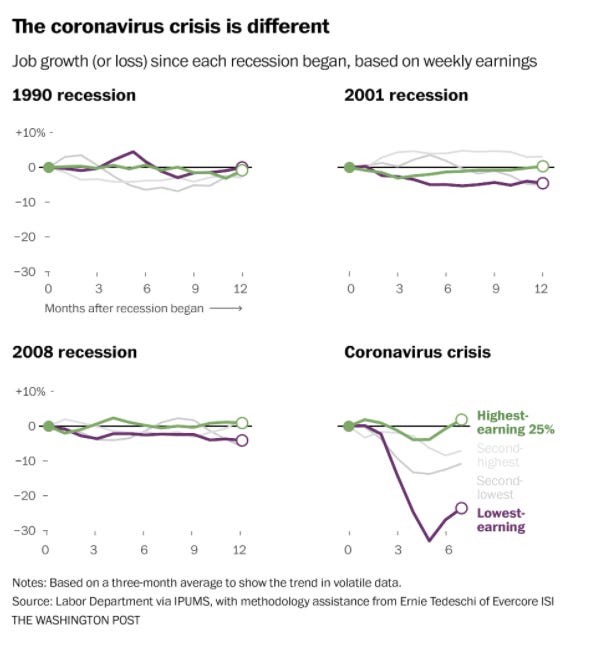A new month, a new quarter, same dread that hovers over us.
Bleak? Perhaps. But I can’t help shake the feeling that we’re at an inflection point.
Yes, there’s an election in 30 some odd days that might look like help is on the way, but an election will not save the thousands of workers who lost their job in the last 24 hours.
28,000 laid off from Disney
30,000 furloughed from United Airlines and American airlines
3,800 laid off from All State
9,000 laid off from Shell
And today’s new claims for unemployment aren’t great.
The Labor Department on Thursday painted a grim picture of the jobs market even before these new layoffs were reported: 837,000 initial claims for unemployment insurance were processed last week. That’s down from a peak in late March and April, but it is still higher than any other period before the coronavirus pandemic.
Another 650,000 people had new claims processed for Pandemic Unemployment Assistance last week, the program for self-employed and gig workers, up slightly from 630,000 the week before.
The total number of people claiming unemployment insurance ticked up slightly, to 26.5 million for the week ending Sept. 12.
Business Insider has a running list of all the major corporations who have laid off workers over the last six months. It’s breathtaking in its scope.
And since the government can’t get its act together, allowing the extra $600/week for unemployment benefits to expire in July, these millions of people have less discretionary spending while at the same time, consumer prices are up 1.3 percent over the last 12 months, according to August data from the Bureau of Labor Statistics. We’re spending 4 percent more on food, and 9 percent less on energy.

And now, months after this thing started, we’re seeing the huge chasm between low-wage workers and high-wage workers, and how systemic racism has played an important factor in how fast people have/can financially recover.
The Washington Post has an important look:
While the nation overall has regained nearly half of the lost jobs, several key demographic groups have recovered more slowly, including mothers of school-age children, Black men, Black women, Hispanic men, Asian Americans, younger Americans (ages 25 to 34) and people without college degrees.

60 million Americans have filed for unemployment over the last six months, which, coupled with the 37 million Americans who were food insecure before the pandemic hit, portends a devastating near-future. The recovery, if we can call it that, will take years, if not decades.
The media supply chain is as good as an indicator of any as how far we have to go to climb out of our hole.
And as we stumble into Q4, I keep thinking about what I wrote in April:
The domino effect of the coronavirus in the media industry ends up at publisher doorsteps. If companies are losing money, laying off people, and not creating products to market, then they’re not spending on advertising. So the flow of money doesn’t hit the agency (which cannot sit on client fees), and ultimately not the publisher. The net result, sadly, are layoffs.
For publishers, Q4 is an absolute headache. There are two types of agencies: agencies who have their shit together and plan for Q1 and the coming year, and agencies who haven’t spent their clients’ money yet and scramble the last quarter to spend to make sure they get paid.
This makes sellers’ heads spin, and this year will be worse.
A significant number of jobs at agencies and publishers have been cut, and a coming second wave of illness, on top of a normally dumb quarter, is going to put more pressure on companies.
If you look at the media circle: the consumer buys product from a company that pays an agency to create/distribute messages for that product and then buy media so that the consumer can see the message to the buy the product.
And right now, the consumer has fewer dollars to spend because they’re not working. And maybe won’t for a while.
With the pandemic still raging and U.S. lawmakers having failed so far to extend federal help for the unemployed and small businesses, many key measures in the world’s largest economy look set to remain weak for some time.
Thank you for allowing me in your inbox, today and every day. If you have tips, thoughts on the newsletter, or have an editorial job that can reduce the unemployment count by one, drop me a line. Or you can follow me on Twitter. If you liked this particular edition of the newsletter, please consider sharing across your social networks and get your colleagues to sign up. Thanks!
Trey Anastasio, “Push on ‘til the day”
Some interesting links:
For the must-reads of the day:
The Attack on Voting (NYT)
The most illuminating moment of the debate (The Atlantic)
Lack of oversight and transparency leave Amazon employees in the dark on Covid-19 (NBC News)
‘A Battle for the Souls of Black Girls’ (NYT)
For publishers:
Playboy to return to stock market after nine years through SPAC deal (Reuters)
Google agrees to pay news publishers more than $1 billion (CNN)
For platforms:
Snapchat has helped 1 million users register to vote, a possible boon to Democrats (NBC News)
Jeffree Star accusers say the makeup mogul has a history of sexual assault, physical violence, and hush money offers (Business Insider)
Biden hires FB exec to be ethics arbiter (Politico)
For revolving door:
New Ford CEO, new leadership plans (Ford)
For media criticism:
Rukmini Callimachi’s reporting troubles (WaPo)
For influencers:
This LA e-girl TikTok house had it all. Then it self-destructed, (Vox)
For CMOs:
Forbes most influential CMO list (Forbes)
For branding experts:
Irish court rules Subway bread is not bread (The Guardian)



